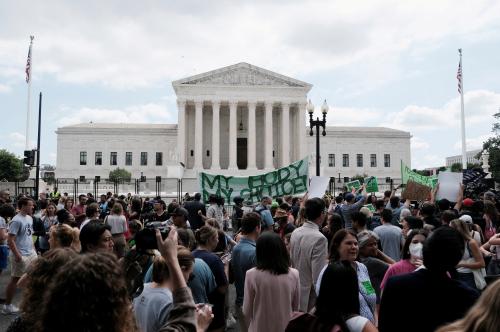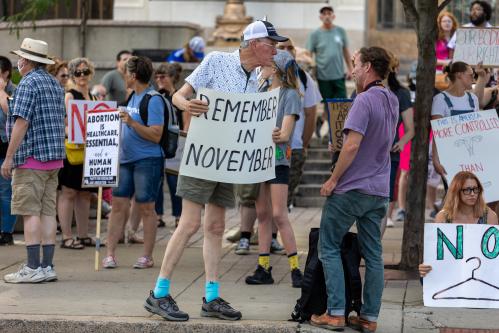As the public becomes increasingly confident that the pandemic is subsiding and the economy is on the mend, social issues are coming to the fore, and developments in two such areas—crime and abortion—could reshape the playing field for the 2022 midterm elections.
When Joe Biden was sworn in as president, the American people regarded the coronavirus pandemic and the economy as the top priorities for Congress and the administration. But now, just four months later, the issues landscape is rapidly changing. Fifty-eight percent of Americans say that the worst of the pandemic is behind us, and 43% believe that the economy is getting better, compared to 29% in January.
The most recent detailed survey, completed on May 26 by YouGov, illuminates these trends. Asked which issues were “very big problems,” 49% of Americans place violent crime at the top of the list, compared to 39% for the economy and just 32% for the pandemic. Forty-five percent of Democrats regard violent crime as a very big problem, a surprising finding explained in part by the fact that 59% of Blacks and 52% of Hispanics put it in this category.
The politics of violent crime is complex. On the one hand, by a margin of 51 to 41 percent, Americans agree that “there is a problem with systemic racism in policing.” Conservatives offering the familiar exculpatory mantra—“a few bad apples”—are losing credibility. On the other hand, only 23% of Americans think that cutting funding for police departments is the correct response. Only 35% of Blacks, 26% of Hispanics, and 36% of Democrats endorse funding cuts. Across the board, most Americans want fairer policing, not less policing.
During his presidential race, Joe Biden understood these sentiments and briskly rejected demands to “defund the police.” Across the country, Democratic mayors have refused to do so, including some who initially supported these demands.
Still, official statistics support public perceptions that violent crime is getting worse, and elected officials from the top on down are likely to be held responsible. Only 36% of Americans approve of President Biden’s handling of this issue, far fewer than for his management of the pandemic (54%) and the economy (45%). And the administration’s efforts to craft an effective response will face a Democratic Party that is divided on the issue, giving Republicans an opportunity to gain ground on it.
The politics of abortion is very different. Public opinion has been stable for decades. Few Americans believe that abortion should be legal in all circumstances, and even fewer support an across-the-board ban. Most think that it should be available, subject to limitations, but they disagree about which limits are appropriate. Most Americans believe that the Supreme Court struck a defensible balance in its Roe v. Wade decision almost 50 years ago, and according to YouGov only 3 in 10 want to see it overturned outright.
But recent events could upend that status quo. The Supreme Court has agreed to hear a case assessing the constitutionality of a Mississippi law that would ban all abortions later than 15 weeks after conception. Upholding this law would mean overturning much if not all of Roe, fulfilling the longtime dream of anti-abortion activists.
Veteran observers believe think that the Court is more likely than not to do this. This is significant because few rank and file voters agree. Even when prompted with the information that “Amy Coney Barrett has joined the Supreme Court, creating a 6-3 conservative majority,” only 21% of Americans in the YouGov poll are confident that Roe will be overturned. Most Democrats were born after abortion became a constitutional right and find it hard to imagine a different reality. Anti-abortion Republicans, who constitute about three quarters of their party, have endured repeated disappointments on the road to overturning Roe and do not believe that the outcome this time will be different.
Against this backdrop of public expectations, a Supreme Court decision upending the status quo, which would come no later than June 2022, would hit the electorate like a bombshell, and abortion rights would move to the center of the midterm election. Most Republicans voters would celebrate, but few Republican strategists would join them. Here is why.
As of now, Republicans are more mobilized to oppose the Biden administration than Democrats are to support it, an asymmetry that could produce the mirror image of the 2018 midterms, when Democrats scored big gains and retook the majority in the House of Representatives. The Supreme Court could change this dynamic in a hurry. Democrats—especially Democratic women—would be protesting in the streets, and many independents and suburban Republicans would join them. Moderate Democrats for whom much of the Biden agenda is politically problematic would be handed an issue that enjoys majority support in their districts, complete with an identifiable enemy who evokes passionate opposition. This single issue would counterbalance Democrats’ political vulnerabilities on other fronts and could enable them to retain control of the House.
It is odd to imagine that a conservative-dominated Supreme Court could save President Biden’s legislative agenda in 2023. But many stranger things have happened during the past five years.








Commentary
How violent crime and abortion could reshape the 2022 midterm elections
June 1, 2021